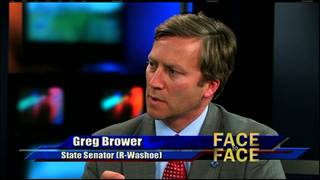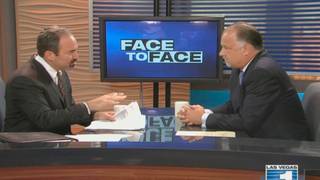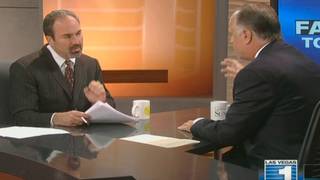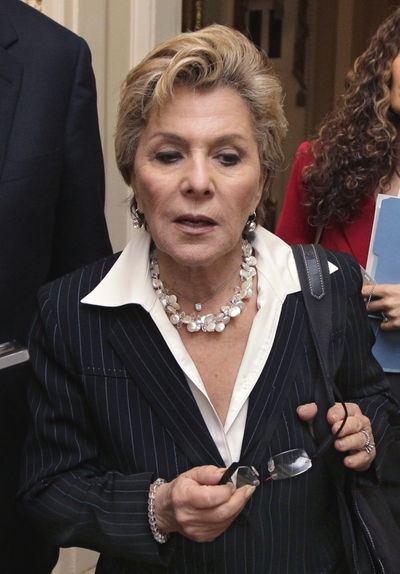Friday, May 13, 2011 | 8:03 a.m.
Related Document
Ethics report
Sun reporter Karoun Demirjian talks to KSNV about the Senate Ethics Committee report on former Sen. John Ensign, May 12, 2011.
Face to Face

Viewing video requires the latest version of Adobe's Flash Player
Related Stories
- Ethics panel chairwoman: ‘Reason to believe that Ensign violated laws’ (5-12-11)
- Dean Heller sworn in as U.S. senator (5-9-11)
- John Ensign poses for pictures, keeps low profile as 16-year run nears end (4-28-11)
- Sandoval chooses Dean Heller for John Ensign replacement (4-27-11)
- Until the end, John Ensign a master of close-call politics (4-22-11)
- Heller appointment to Senate changes campaign calculus (4-22-11)
- Dean Heller could get boost, but can't shake bout with Shelley Berkley (4-22-11)
- If Dean Heller chosen to replace John Ensign, fallout would be felt down the ticket (4-22-11)
- Sandoval: Sen. John Ensign replacement will be named before May 3 (4-22-11)
Resignation Letter
Ensign Timeline
Sun Coverage
Beyond the Sun
- Politico: John Ensign report filled with bombshells
- The Wall Street Journal: Senate Panel Finds Wrongdoing By Ensign; Refers Case To DOJ
- The Hill: Senate report: Santorum emailed Ensign that affair could be made public
- The Washington Post: Senate ethics committee: Ensign violated federal laws
- The New York Times:Ethics panel asks that Ensign inquiry be reopened
Doug Hampton interview - July 2009

Viewing video requires the latest version of Adobe's Flash Player
Doug Hampton interview, part 2 - July 2009

Viewing video requires the latest version of Adobe's Flash Player
The people named in the Senate Ethics Committee’s report on former Sen. John Ensign reads like a who’s who of Nevada’s power elite.
There’s Senate Majority Leader Harry Reid, who helped get Doug Hampton, Ensign’s former staffer and jilted best friend, the job at Nevada Power (now NV Energy) that let the Hampton family move to Las Vegas in 2004.
There’s Sig Rogich, the longtime GOP operative who advised Paul Steelman — a Las Vegas architecture consultant who designed dozens of casinos, hotels and strip resorts — against hiring Hampton when Ensign tried to land him a job outside his office after Ensign’s affair in 2008.
There’s Mike and Lindsey Slanker, the Republican consulting pair who have run campaigns for Gov. Brian Sandoval and are consulting Sen. Dean Heller on his upcoming election bid.
And there’s John Lopez, Ensign’s former chief of staff who now is vice president of government and public affairs for R&R Partners, the state’s most powerful public relations and lobbying firm.
Some from the supporting cast of characters in Ensign’s drama are victims, others are bystanders and a few are portrayed as collaborators.
United, they’re a snapshot of Nevada’s entrenched, myopic political structure that reaches from Las Vegas to Washington, D.C., the contorted intricacies of which are partially untangled in the 75 pages of this report.
But now divided by Ensign’s transgressions, there’s the distinct possibility that the revelation of these sordid details may cause others to fall.
The Team (Hampton, Lopez and Slanker)
The line between victim and villain is an awfully thin one in a case like this. There’s no clearer example of that than Doug Hampton. Back in 2009, he was being roundly pitied for having lost his wife, his best friend, and his career in what seemed like one especially cruel twist of fate; today, he’s under indictment — the only person yet to emerge from this mess to face down charges in a courtroom.
Hampton’s Ensign problem began way before the senator sweet-talked — or as the report suggests, potentially coerced — Hampton’s wife into bed with him. That was only the last and most destructive stage in a pattern of dependency that had grown up between the Hamptons and the Ensigns.
The Ensigns were writing large checks to the Hamptons long before $96,000 was ever transferred to tamp down tensions over the affair. At the time, it wasn’t hush money, it was more of a helpful handout: in addition to paying both adult Hamptons’ salaries, the Ensigns helped them with the mortgage on their Summerlin home, paid for them to join the Ensigns on family vacations, and even paid full tuition for the Hampton children so they could attend the same private school as the senator’s kids.
Over years, the report shows the Hamptons becoming addicted to the lifestyle like junkies, and the Ensigns continuing to enable their friends’ habit of believing they could continue living so far beyond their own means like the social equivalent of a subprime mortgage financier.
The Ensigns are portrayed as the meal ticket the Hamptons didn’t know how to live without. It appears to be what made Cynthia Hampton too fearful to more forcefully break off the romantic entanglement with Ensign, and why Doug Hampton, even after he was told he should not be contacting the senator any longer as a lobbyist, couldn’t let go. He believed, as he reminded Ensign in an email sent shortly after he left the Senate office in early May of 2008, that “regardless of the circumstances, you ensured me that I would not be injured as a result of leaving your organization.”
The Hamptons weren’t the only ones who had developed an almost unfathomable dependency on the Ensigns. You could say the same about his chief of staff through the affair, John Lopez.
Lopez is undoubtedly the star witness of the Ethics Committee’s report, but he’s shown throughout exhibiting an almost lapdog-like loyalty to the senator, facilitating his attempts to cover up his screw-ups and even volunteering to be the go-between for Ensign and Hampton after the latter had departed to start lobbying, as a way of keeping the senator and his junior staff clean of any criminal culpability.
“I tried to just keep this away from [Senator Ensign] as much as possible, and I viewed myself as being loyal and handling it on my own,” Lopez told the committee, “which is what I believe he expected of me.”
Lopez and Ensign’s relationship went back to the beginning of Ensign’s Senate career; in fact, Ensign’s congressional career essentially was Lopez’s congressional career. Lopez started off working for Ensign when he was the House representative for Nevada’s 1st Congressional District in Las Vegas as a legislative assistant, moving up in seniority until 1998, when he switched over to be the northern Nevada coordinator for Ensign’s first unsuccessful Senate campaign.
Despite his uncommonly long term of service, Lopez and Ensign weren’t close. Lopez characterized their relationship as “an inch deep and a mile wide,” because Lopez — who even in his current role now as a lobbyist is a rather mild-mannered and soft-spoken fellow — wasn’t the kind of “alpha male” Ensign liked to keep closest, he said.
So while it was a bit of an insult, it was not a surprise, Lopez explained to the committee, when Ensign brought Hampton, who had no congressional experience, onto his team to split the chief-of-staff functions with Lopez, who by that point had logged about 12 years of service in a variety of roles. Still, he did it and didn’t ask questions, because of “the perception that Mr. Hampton was an untouchable subject,” the report said.
Lopez recalled an incident where Ensign had snarled at a staffer, who’d previously been a Marine Corps colonel, when he told the senator Hampton wasn’t well-liked by the staff. “Senator Ensign [gave] the colonel a look like ‘don’t you dare go there’,” Lopez told Ethics interviewers. “That really stuck in my mind, because I thought, you know, if a Marine Corps colonel who [Senator Ensign] respected without question can get dressed down by [Senator Ensign] for bringing up [Hampton’s] name, then certainly it would most definitely happen with me.”
So Lopez continued to facilitate Ensign’s alleged illegal dealings with Hampton, getting his hands so dirty in the process that he only spoke to the Ethics Committee on the condition that his testimony couldn’t be used to implicate him. While that creates significant legal buffers in his favor, it still doesn’t mean he’s completely off the hook if prosecutors can find convincing corroborative evidence elsewhere.
Mike Slanker, the brains behind Ensign’s campaigns, on the other hand, has no such immunity but appears to be almost as heavily implicated as Lopez on others’ testimony. The report credits him with resuscitating November Inc., a powerful Nevada lobbying firm that was at the time nonfunctional while Slanker and his wife, Lindsey, worked on other projects.
November Inc. was supposed to serve as a “business card” for Hampton — who with almost no knowledge of Capitol Hill and few connections past Ensign, was the unlikeliest of effective lobbyists — to get himself up and running with a few clients Ensign would hand-pick for the job.
The report does say that when the initial idea to use November Inc. as Hampton’s parachute came up, the Slankers weren’t aware of the affair. But long before the deal was finalized, and even longer before Hampton stepped out of the Senate and into his new role, Darlene Ensign called Slanker to personally tell him about the affair, a charge he later confirmed with Hampton, and the two spoke about it with Ensign in his office at the National Republican Senate Committee’s headquarters, which he was chairing at the time.
As a staffer, Slanker isn’t at risk of being called up before any ethics committees, and because he only assisted in setting up Hampton in his new role, he wouldn’t be criminally culpable of anything except, potentially, aiding and abetting if Hampton is found guilty in Federal District Court of violating the cool-down period rule.
But Slanker’s another example of the very tightly-woven Nevada political web: he’s advised almost every prominent Republican who’s run for any prestigious office in the state and is currently providing his winning expertise to Heller’s Senate campaign. Depending on how the allegations against both Ensign and Hampton move forward, there’s the chance that the stink of Slanker’s alleged affiliation, now public, might be too strong to some to politically stomach, which could shake up a few strategies for 2012.
Neither Slanker nor Lopez returned requests to comment for this article.
The Outsiders (Coe, Coburn, and the Companies)
Much was made of the intervention members of Ensign’s Christian Fellowship group, which congregated at a house on Capitol Hill that’s come to be known simply by its street address, “the C Street house,” tried to stage to convince Ensign of the evil of his ways and to make amends.
Not that much has been made of the role played by their spiritual adviser, Tim Coe.
Coe, the report suggests, kind of played the role of chess master in arranging all the introductions and conversations which would widen the circle of those in the know — so much so, in fact, that Ensign cursed him out on at least one occasion when Coe phoned his father to help out.
Coe was the first to ask Ensign to write the now-famous letters of apology to the Hampton family and his wife that were supposed to end the affair and begin the process of seeking forgiveness. He was also the first to notice that Ensign was lying to some of his fellow C Street colleagues and decide that Ensign wasn’t participating in their intervention efforts in good faith.
Coe was also the first to suggest that Ensign provide “transition finances” to get the Hamptons out of Las Vegas and told Ensign straight up that he was “insane” when the senator informed him that the Hamptons would be sticking around and becoming lobbyists.
And perhaps critically, Coe was the person who brought in Ensign’s father, Michael Ensign, to help finance that arrangement and Sen. Tom Coburn, a Republican from Oklahoma, to help negotiate it.
Coburn is, socially and fiscally, about as conservative as it gets in the U.S. Senate. And like or hate his politics, he’s also seen as one of the most principled members of the senate by his colleagues.
Which makes all the more curious that he stepped up to play middleman as Hampton and Ensign hashed out the dollar terms of their secession agreement, essentially actively haggling at times with Hampton to bring down his asking price.
The report’s portrayal of Coburn’s involvement in the process has a whiff of comedy: “Senator Coburn recalled that he was on his tractor at his home mowing his lawn at the time, and was annoyed to receive [a] call in the middle of that task,” the Ethics Committee lawyers wrote.
Hampton’s lawyer suggested Ensign pay $8 million to get the Hamptons out of his hair. Coburn called the figure “absolutely ridiculous,” Hampton’s lawyer testified, and counter-offered that Ensign would buy the Hamptons’ property for about $1.2 million and then give them another $1.6 million in seed money to start fresh. Coburn denied that he made specific proposals to the Ethics Committee.
Acting as a middleman and negotiator — which Coburn says he wasn’t — of a shady deal isn’t a clear-cut aiding and abetting of a crime, especially because it seems like the charges that are sticking in the general sphere of the particulars of this case are sticking to Hampton’s breaking the one-year cool-off rule, something Coburn had nothing to do with.
But the Senate Ethics Committee doesn’t just appeal to a criminal standard. “This Committee and the Senate have frequently noted that even if conduct does not constitute an actionable violation of law, Senators must meet a much higher standard of conduct,” the report states.
One of those standards, Chairman Barbara Boxer reminded the Senate, is conduct befitting a senator. The report is written in a way that gives the impression that Coburn was strategizing a deal in which Ensign would pay massive sums of hush money to the Hamptons. If some senators reading the report took issue with such conduct, it’s possible that the Ethics Committee could be asked to start an investigation into the actions of another in their ranks.
The Ethics Committee would not comment Thursday as to whether any such inquiries had been raised against Coburn.
Getting back to the subject that’s currently causing the most controversy though: the violation of the cool-down period. If Hampton violated the rules, he was being paid to do it by some pretty deep-pocketed companies that were buying his services because of his relationship to Ensign — a conscious relationship that becomes even more well-established if the claims that Ensign was the one to set up Hampton’s initial lobbying contracts are substantiated.
That could drag a number of Nevada-based companies, including Allegiant Air and NV Energy, into this whole morass.
The state GOP
We know now that Ensign’s affair was blew up the state GOP as if its members had collectively swallowed explosives, but how, some wonder, could things have gotten to that point in the first place and why did the party let itself ferment in the runoff of Ensign’s actions for almost two whole years before he left?
“We are a small state. Companies, their executives and public officials inevitably know one another. That’s just the nature of this community and of this state,” former governor and National Republican Committee member Bob List said.
The coziness among Nevada’s power brokers could explain why the state’s Republican establishment failed to call for Ensign’s resignation two years ago, when Hampton came forward with his story.
Ensign at the time was the top-ranking Nevada Republican, whose father Michael Ensign is a casino mogul. Party officials were loath to cross him.
“We’re a one-industry town,” conservative consultant Chuck Muth said. “You don’t mess with a U.S. senator, much less one with ties to gaming.”
The commission’s report outlined a pattern of Ensign using his influence to bully people and try to extract favorable outcomes for himself, a habit with which Republican insiders were surely familiar.
A telling example: when Ensign discovered that Rogich advised Steelman against hiring Hampton, Ensign forced Lopez, his chief of staff, to call Rogich and “jack him up to high heaven and tell him that he is cut off from the office and never to contact [Sen. Ensign] ever again.”
Lopez bristled at the task but feared disobeying his boss. “I remember really feeling like that was abusing the office,” Lopez told the commission.
If Ensign’s tactics slowly started losing him his friends in the party back in 2008, they fled from him like the plague once he’d announced his affair in 2009 and the investigations got under way. While many bemoaned his continued presence around the Nevada political establishment, nobody banded together the troops to force him out.
Ensign would leave under his own volition, now likely running out the door just in time to avoid having to testify under oath against his actions. The report says he was scheduled to be deposed as the investigation’s culminating witness over May 4 and 5, and that after learning this, he announced his resignation from the Senate, effective May 3.
It’s now up to the Nevada GOP to pick up the pieces as they gear up for a new election.
The fact that 2012 is a presidential campaign year will help; so will the fact that Gov. Brian Sandoval quickly moved to re-sod the Senate seat with a fresh, untainted politician with room for growth in the form of Dean Heller after Ensign cleared out.
But while John Ensign was shunned the last several months, his most influential staffers weren’t. Some were even brought in to advise the new fold.
While the staffers and associates named in the report appear to be free from criminal wrongdoing, the taint of being wrapped up in the Ensign affair could follow them and their clients. Smart Democrats could use the Slankers’ relationship to Sandoval and Heller as damaging material for political campaigns.
“It’s all the same team,” UNLV political scientist David Damore said. “It’s the new northern elite.”


Join the Discussion:
Check this out for a full explanation of our conversion to the LiveFyre commenting system and instructions on how to sign up for an account.
Full comments policy